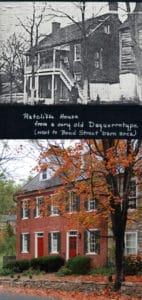Why We Live in Waterford
Today, visitors to Waterford, Virginia, experience many of the same views as residents in the 19th century. Waterford preserves the ambiance and many of the structures that characterized it during its heyday as a flour milling town in the 19th century.
Well into the 20th century most Americans lived and worked on farms or in small towns much like this one. Few of those places remain much as they were. Waterford, miraculously, is one that has. Waterford t is a story of ordinary people who did extraordinary things. They built a thriving town from wilderness; they endured a long and bloody war that threatened to destroy it; and in good times and bad they held tightly to their vision of a special place.
Residents of Waterford see themselves as caretakers of the historic homes where they live. They maintain their houses so that they reflect their history and only make changes that will not adversely change the character of the village. In one hundred years from now, the village will hopefully look as it does today.
"Of over 2,000 National Historic Landmarks,
Waterford is the only one of its kind".
"What we are saving is America's history for generations to come".
An Impression of Waterford
Deborah Dunn, Leesburg, Virginia speaking at a hearing concerning the demolishing of the historic Simms house
We have been to many historical homes and communities in the United States, Canada, and Europe, but we have never been anywhere that could compare to Waterford. Last summer I visited the community at Appomattox Courthouse and also the home of Patrick Henry. What I have noticed in touring homes that are no longer occupied, is that although they are interesting and informative, there is this sense of coldness that starts somewhere in the middle of your stomach when you enter the home; even on the warmest summer day. The chill grows as you walk through the home. The home was designed to serve as shelter and a warm safe place. Sitting empty, it is as if the structure has lost its sense of purpose.
Waterford has a completely different feel. It is the people who love and care for these delightful old homes that make the difference. These homes are warm and alive. They have continued to serve the purpose for which they were intended. They have been lovingly preserved and are graciously shared with those of us who want to know what it was like to live back in the days when our country was firsts finding its feet.
My thirteen year-old son, Michael, accompanied me as a docent for the Waterford Fair house tours. We were break-givers so we were in and out of many houses. About half way through the day, I paused in my presentation to collect my thoughts. Michael, my extreme sports-loving child surprised me piping up to relate a story that he thought I had forgotten and to point out an interesting architectural element. I was astonished. From that point on, Michael and I shared the presentations. This is the kind of opportunity that Waterford provides to those of us who have always loved history, but more significantly for our young people who have never before had this kind of exposure.
Michael and I have committed to making this an annual event. The last thing that we want to hear when returning to the Waterford Fair in years to come is that “this is where the Simms house used to be”. We do not want to have to imagine the architectural style or try to uncover the original structure simply because the owner has become less than content with the square footage or because they were unwilling to be creative enough in their space planning to preserve this structure.
